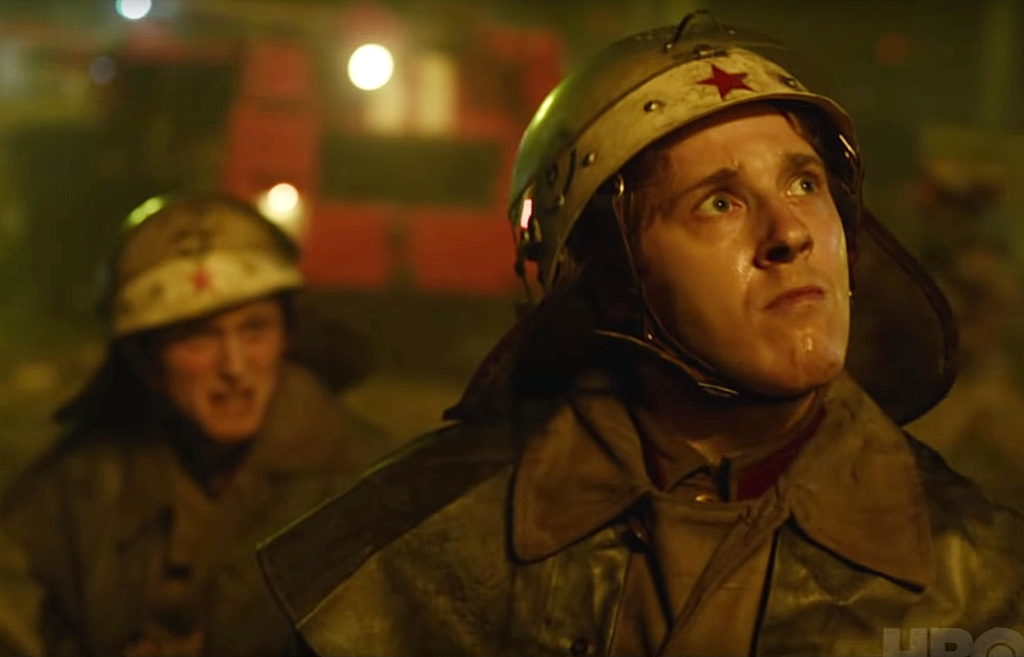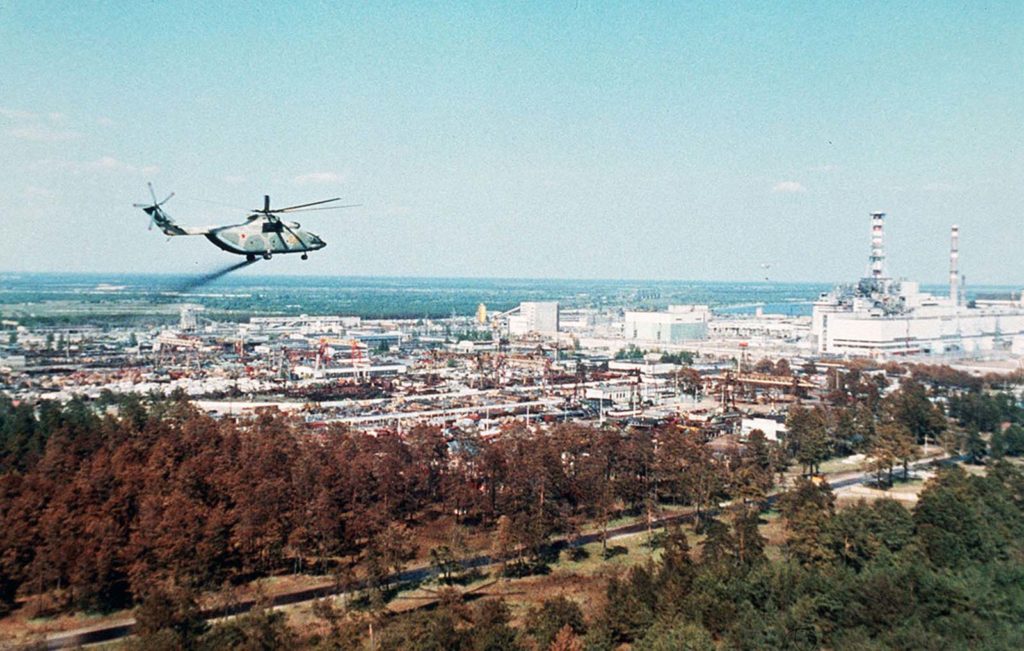For a show dedicated to the inherent inviolability of the truth, HBO’s five-part miniseries Chernobyl certainly takes its fair share of liberties with it.
Is that a good thing? That’s a good question … in fact it is the question to ask if you decide to watch the show (which we highly recommend you do).
Created by Craig Mazin and directed by Johan Renck, this critically acclaimed series dramatizes the events surrounding the world’s most notorious nuclear accident – which took place on April 26, 1986 at the V.I. Lenin Nuclear Power Plant in northern Ukraine. Shortly before 1:30 a.m. (Moscow time) on that fateful date, back-to-back explosions rocked the newest, most modern of the plant’s nuclear reactors – reactor No 4.
These explosions took place, ironically, during a safety test – one intended to prevent a meltdown of the reactor in the event the power supply at the plant were to go offline during an emergency.
How did a safety test create the conditions for such a continental catastrophe?
Historians generally agree the accident was the result of serious design flaws with the Russian reactors, the lack of safety features installed in the facilities that housed them and poor judgment/ errors on the part of the technicians who were conducting the test.
The two explosions destroyed the reactor’s core and released radioactive matter across Europe – specifically, more than 400 times the fallout from the detonation of the first atomic bomb over Hiroshima, Japan in August 1945. Hundreds of thousands of people had to be evacuated from the vicinity of the plant, which is still surrounded by an “exclusion zone” to this day.
Here is a look at Chernobyl’s dramatization of the moment the explosion took place …
(Via: HBO/ YouTube)
Dozens (and potentially hundreds if not thousands) of people ultimately lost their lives in connection with this accident, which laid bare the inherent dangers associated with nuclear power while exposing the culture of secrecy that existed within the former Union of Soviet Socialist Republics (USSR) during its “era of stagnation.”
Amazingly, the disaster could have been exponentially worse had firefighters, plant workers and Soviet soldiers not heroically battled the blaze and taken steps to prevent the meltdown from destroying the entire facility. Had that happened, millions could have died and half of Europe could have been rendered uninhabitable for hundreds of thousands of years.
Many of these heroes succumbed to acute radiation syndrome (ARS) in the days, weeks, months and years following the disaster.
Despite its elevation of the sanctity of truth in our post-truth world, Chernobyl has been slammed for various exaggerations and fabrications. Most notably, the series was taken to task by journalist Masha Gessen in a lengthy column that appeared in last month’s editions of The New Yorker.
After extensive nitpicking, Gessen eventually got down to his root complaint: That the show is a lie. And a formulaic one at that.
“In the absence of a Chernobyl narrative, the makers of the series have used the outlines of a disaster movie,” Gessen wrote. “There are a few terrible men who bring the disaster about, and a few brave and all-knowing ones, who ultimately save Europe from becoming uninhabitable and who tell the world the truth. It is true that Europe survived; it is not true that anyone got to the truth, or told it.”
[su_dominion_video_scb]“One might say that these are fantasies, embellishments, shortcuts, and even translations,” Gessen concluded. “Whatever they are, they are not the truth.”
Former workers at the Chernobyl plant tend to agree with him, accusing the show’s producers of inaccurately portraying the three men who were ultimately held responsible for the disaster – plant director Viktor Bryukhanov, chief engineer Nikolai Fomin and deputy chief engineer Anatoly Dyatlov.
“Their characters are distorted and misrepresented, as if they were villains,” former Chernobyl engineer Oleksiy Breus told the BBC. “They were nothing like that.”
Breus went on to refer to Chernobyl’s portrayal of Bryukhanov, Fomin and Dyatlov as “not a fiction, but a blatant lie.”
Chernobyl is also receiving criticism for its use of a composite character, a fictitious nuclear physicist named Ulana Khomyuk (portrayed by British actress Emily Watson), as part of its historical narrative. According to the show’s producers, Khomyuk was created to pay tribute to “dozens of scientists” who worked alongside real-life Soviet chemist Valery Legasov (portrayed by British actor Jared Harris) in an effort to mitigate the effects of the disaster and bring the truth about what caused it to light.
Legasov and real-life Soviet deputy minister Boris Shcherbina (portrayed by Swedish actor Stellan Skarsgård) are depicted as the heroes of this tragedy – battling party leaders and agents of the KGB at every step of its horrific evolution to protect the public from its toxic fallout.
“Every lie we tell incurs a debt to the truth,” Legasov stated during a gripping courtroom monologue that appeared in the final episode of the five-part series. “Sooner or later, that debt is paid. That is how (a Soviet) reactor core explodes. Lies.”
(Click to view)
(Via: HBO)
In the hopes of correcting HBO’s “lies,” state-supported Russian network NTV has announced it is responding to the American series with its own Chernobyl-related dramatization – which purportedly pins the blame for the reactor accident on an alleged infiltration by the U.S. Central Intelligence Agency (CIA).
“One theory holds that Americans had infiltrated the Chernobyl nuclear power plant and many historians do not deny that, on the day of the explosion, an agent of the enemy’s intelligence services was present at the station,” Russian director Alexei Muradov told The Moscow Times, referring to the upcoming series.
Obviously, we wouldn’t put anything past the habitually dishonest CIA but such an explanation strikes us as exceedingly far-fetched, especially given the global calamity that would have ensued from the complete destruction of the Chernobyl facility. Furthermore, the Russians have essentially acknowledged the design flaws, safety lapses and operator errors that led to the tragedy.
One Russian writer believes the criticism of the series is driven partly by embarrassment – partly by jealousy.
“The fact that an American, not a Russian, TV channel tells us about our own heroes is a source of shame that the pro-Kremlin media apparently cannot live down,” Ilya Shepelin noted in a piece for The Moscow Times.
(Click to view)
(Via: Rare Historical Photos)
Our view on all of this? First and foremost, it is important to remember Chernobyl is historical fiction. When you watch it, what you are seeing is a dramatization – not a documentary. While the series obviously sought to achieve historical accuracy, it occasionally sacrificed that accuracy (i.e. the truth) in pursuit of the enhancement of its narrative – which, again, is ironic considering the whole point of its narrative is that the truth should be valued above all else.
Sometimes this sacrifice works, sometimes it doesn’t … sometimes it elevates the underlying narrative, other times it needlessly detracts from it.
We have read multiple accounts of the Chernobyl disaster – including Adam Higginbotham’s masterful Midnight In Chernobyl – and it seems clear to us from these volumes that the allegations of former plant employees as to the HBO series’ distortions and misrepresentations are well-founded.
Having said that, the series has also drawn praise for its disarmingly realistic depictions of life inside the former “Evil Empire” – which collapsed within five years after this accident.
The question then becomes as follows: Does the extensive creative license taken by the show’s producers invalidate its larger narrative?
Or put another way, does Chernobyl veer so far afield of the truth as to render itself hyperbolic and hypocritical? Muting its overarching message?
We think not, because ultimately truth cannot be invalidated. It can be hidden, delayed, twisted, missed, misjudged, misapplied … and many other things … but it cannot be invalidated.
And in a very real, very eternal sense … none of us can outrun it. Ever.
This is a vitally important message – one that our “post-truth” society desperately needs to hear – and Chernobyl delivers it artfully, emotionally and unflinchingly (even with its myriad of errors, embellishments and exaggerations). For this reason, we believe the show is a triumph – if not always true to the events that transpired nearly 35 years ago.
“To be a scientist is to be naive,” Legasov noted in the closing voiceover of the miniseries. “We are so focused on our search for truth, we fail to consider how few actually want us to find it. But it is always there, whether we can see it or not, whether we choose to or not. The truth doesn’t care about our needs or wants. It doesn’t care about our governments, our ideologies, our religions. It will lie in wait, for all time.”
Amen to that …
-FITSNews
WANNA SOUND OFF?
Got something you’d like to say in response to one of our stories? Please feel free to submit your own letter to the editor (or guest column) via-email HERE. Got a tip for us? CLICK HERE. Got a technical question or a glitch to report? CLICK HERE. Want to support what we’re doing? SUBSCRIBE HERE.


